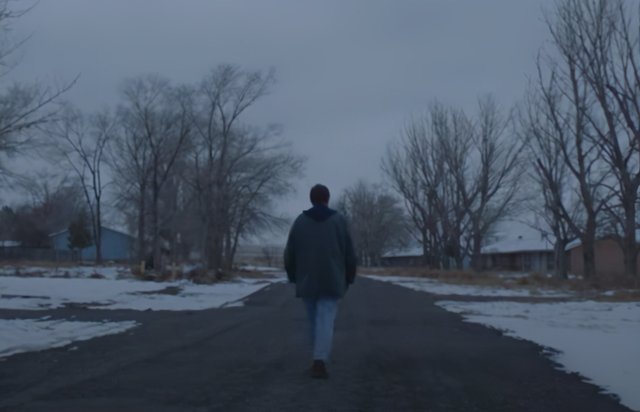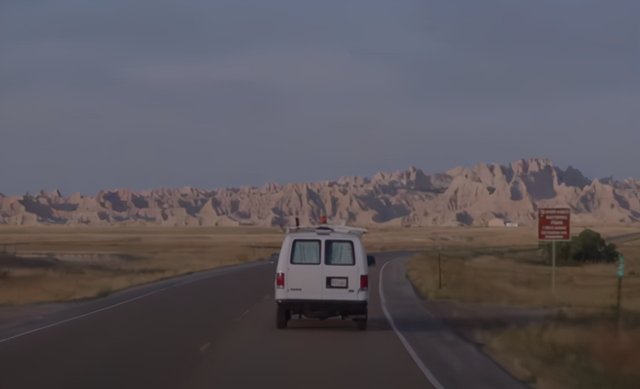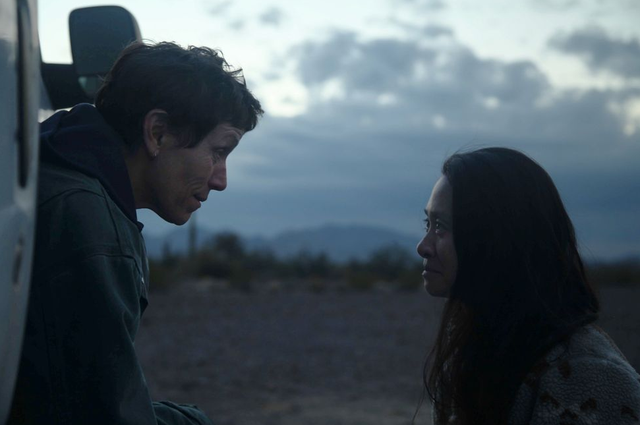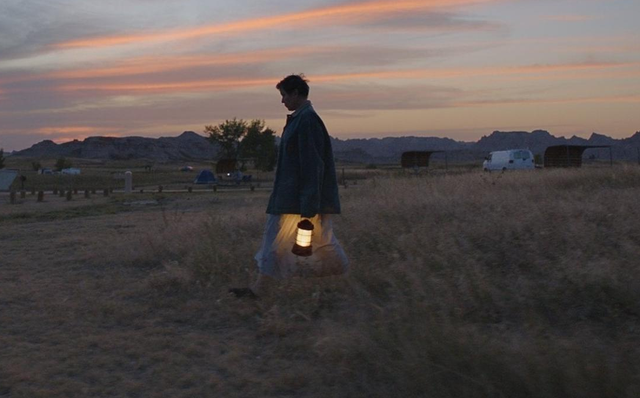Film Review of Nomadic Life: Lifting the veil of disillusionment and putting on the clouds of poetry
The great insignificance
In "Nomadic Life", more than one scene, the use of contrast to present, the smallness of man, whether it is the green mountains, waves of the coast, long roads or desert. In this regard, the viewer not only crawls out from the wrinkles in the close-ups to find Finn's loneliness, but also tastes the loneliness of being alone from the silence that grows everywhere. For this reason, every part of the film is so easily squeezed to the heartstrings.
Although the pace of the film is slow, there are many events, the audience follows Finn to walk and stop, in which, the delicate stacking, coupled with the spatial distance of the pull, we can clearly feel the emotions, it flows on and off the screen. If you have never experienced Finn's upheaval, you will be shocked to discover a different corner of the world. However, if you have traveled through multiple cities as Finn did, you will be able to recall how much magic one's solitude has, how sensitive it can push the senses, or how much it can aggravate the pace to hobble. I think the heart of a wanderer is what these nomads embrace day by day, the biggest difference is that they don't have a place to go back to, like the wanderer. They wander the world, sometimes they put themselves into the river to wet themselves, so as to feel the vastness and tranquility of life, and sometimes they return to the factory to collage the products, so as to support themselves to go on again. In this way, day after day, the cycle continues, like driving on a long highway, with no end in sight, but no other better choice around, and this is like the message at the end of the film, nomadic life, not easy, and even wrapped in a lot of helplessness. For this reason, "Nomadic Life" seems to be full of poetry, but it also contains a tight disappointment.
As mentioned earlier, a large part of this helplessness comes from economic hardship, and therefore, even though most of the film's scenes are from the wilderness to the township, it is still powerful enough to criticize the cruelty and decay of the city's neon. This part of the film is like a deliberate oversight, through the deliberate omission, or the focus of the perspective, to achieve a distortion of vision, prompting the viewer to think about the causes of nomadism and the omissions of the system. In this regard, the film is not only to celebrate the beauty of nomadic life, but also to point out the imbalance and tilt of contemporary society. In the end, we only have an hour or so to peek into the complex issues, and the cut surface is so limited. Even more, for nomads, they have long been pushed to the edge of society, just thinking about the next meal, has been exhausted, there is no way like the middle class or intellectuals, can also go to the high wall, try to voice to collide. In this regard, the director's adaptation is crucial, allowing the plot to move forward smoothly while maintaining the same tone. As mentioned before, the film brings out many gentle but firm views, which is the most fascinating magic of Zhao Ting as a director.
In a nutshell, the film makes people feel small not only because of the vastness of nature, but also because of the indifference of the social system. In other words, smallness is the main emotional axis of this film. However, even though small, they are not humble or weak. The light and fire in the eyes of the characters portrays a resolute outline that makes people admire and naturally admire the nomad's courage to coexist with the "wilderness" and "have to".
Even though they are small, they are too determined to be ignored. The Absence of Life
In "Nomadic Life", what is absent is not only the accusation against the capital society, but also the absence of various kinds of existence of the film's characters, whether it is a son who lightly died, a broken family relationship or a husband who passed away. To some extent, the lives of these nomads are missing a piece, which makes people think that every departure and migration, in addition to economic considerations, is also to find their own lost. As the movie says, everyone is probably looking for an answer, a truth that can give them peace, to fill the lost corner of their soul.
However, even though they are looking, but the lost things, but from person to person, this difference, but also destined to some people, this life will only hold the feeling of lack, in the forward. Back to Finn, what she lost was life, no matter how she explored, the hotter the love, the bigger the hole that melted in the heart, but I think the hole, perhaps like Dave said, is the footprint that was there.
Boy: Why does this stone have a hole?
Dave: Because there was once air there before.
In this way, Finn's sense of emptiness is all because she has loved hard, and the so-called lonesomeness and loneliness is all because of the empty hole, which is the reason why Finn is having trouble getting back into a relationship. She was so tired that she could not afford a second absence in her life, so she declined everyone's offers, not only because of her pride, but also because she did not want to get hurt again. Moreover, she was afraid that filling this one thing would make the original hole disappear, and the hole, for the displaced her, is the only remaining relic that can miss her husband, even if it stings and sticks, still can't let go. In this regard, I privately believe that Finn walked to the end did not really have to put down, on the contrary, the final discard of the film, more like a symbol of determination, meaning that she wants to put all the thoughts, into the hole, and then carry the pain, and continue to move forward, as long as they still remember, seemingly dead life, will always exist, but in a different way. Since then, walking and walking, as life burned out, Finn also believed that at the other end of the highway, there would be love waiting for her, just to meet with herself again. So, the pain of longing, for Finn, is not a wedding ring that cannot be taken off, or a curse that cannot be gotten rid of, but a star that leads her, making her believe that even if they are tens of light years apart, love will still have the day to be reflected in her eyes again.
This can't let go, in the end, also refined into another kind of put down, even with the common imagination is not quite the same, but the weight of it, is Finn can independently carry the sweet burden. Such an arrangement is precisely like Zhao Ting's last work "Rebirth Knight", in which the main character gives up the pursuit of masculine power in order to find redemption. For this reason, these characters are so fascinating because they possess vulnerability and imperfection, yet they are also willing to take on these feminine aspects and reconcile with them, rather than conquer or transcend them. In this way, although not extraordinary supermen, but brave living civilian heroes. Many people will say that this is a classic road movie, but combing through it, we can find that it is actually a solid film of loss, about people's mourning, can't let go, loneliness and despair. Even the journey and wandering without an end is like the traumatic feelings that every grieving soul will have when they suffer a loss. I think, whether it is the actual highway or the inner road of the heart, facing the absence of life, we are all like Finn, longing to find peace, but afraid to find peace, so we have to keep pulling and tug, ignorant, and then stumbling to live, just to be able to breathe in the moisture of life again.
The hole that makes one's heart ache seems to be nothing, but it is actually full of a lot of love. From disillusionment to poetry
Although the main axis of "Nomadic Life" focuses on disillusionment, be it financial, life or emotional, one does not let oneself starve, and as long as one wants to live, we will find a way to find a short-lived salvation that can extend one's life again. In this regard, nomads seem to have no house, but they are not without a home, just like ordinary people who have their own family and community, they also have their own magnificent.
Even though they have a hard life, the film does not make the nomads into miserable and pathetic little people, instead, it polishes them into bright and shining pioneers, focusing on how they gain autonomy and balance from freedom, loneliness and survival. Back to the atmosphere, this also makes the image, from the disillusionment of poetry, so that people understand the resilience of perseverance, tears and sweat, can be boiled into a beautiful rainbow, even if there is no luxury, simplicity still contains the pulse of life, as long as your eyes, willing to look out, your heart, you can leap to the horizon. This kind of freedom also makes many people feel excited, excited and envious of the nomadic life, hoping to become a part of it, in order to cleanse themselves of the stain of society. Perhaps, we all need a little nomadic spirit, in order to have the resilience to maintain hope in the situation we have to be in, or the skill to strike a balance between freedom and reality, in order to be able to place the scales of life in the right place, in order to strike a vivid music of life. Then, like a nomad, you can finally breathe the quiet of the wilderness, metabolize the crowded campfire, and then find the campfire with the inspiring dream, and sing the story for the next goodbye, no matter if it is you, others or the dreamscape. For this reason, we all have to become our own oil lamp in order to lead ourselves instead of being trapped in the cage of imagination and living as a bird of prey. Ultimately, the film comes out with a different tone, redefining nomadic life in an aesthetic way, stripping away the loser label from nomads, and even making the fall from the edge of society into a glide before taking off. Therefore, nomads are not homeless, but have heaven and earth as their home, just like the souls running through the Milky Way and the Star River, each shining and moving, which also reminds people of Swanky, a fighter who still has the stars in his eyes even at the end of his life.
On the whole, not only the nomads strike a balance between economic material and natural wilderness, the film also skillfully strikes a balance between art and documentary, allowing people to be moved by beauty, but also to reflect on it because it is not beautiful. Perhaps, in this, we can't find any answer, not even an object of accusation, but this film, indeed, can make people go on a road trip of images, so that people can measure the world and themselves again.
Exile yourself, often in order to find yourself. Conclusion
If you don't know Zhao Ting, this would be a good opportunity to do so. Most of his works focus on individuals in the flood to outline, which also prompts the emotions of the film's characters, just like "Nomadic Life", like a dense but tumbling wave, wave after wave. However, Zhao Ting's excellence lies more in the deconstruction and reconstruction. Her warm and delicate perspective can always stuff the rising hope into the valley of the characters, and then flip from the gray and astringent failure to the brilliant and splendid. In her vision, even the sunset can render an orange warmth, and people can still hold their heads high and stride forward even if



